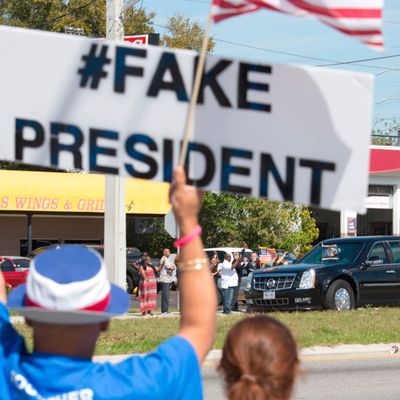
The Public Religion Research Institute, which regularly does valuable polling and analysis on issues where politics and religion intersect, has a new poll out this week. They’ve also supplied some analysis breaking out white Evangelical respondents to their poll (about 17 percent of the sample), showing that support for Donald Trump among the paler born-again folk is at “an all-time high”:
White evangelical support for Donald Trump has steadily increased over time. Notably, Trump’s favorability among white evangelicals never reached 50 percent during the 2016 primary season. By the early fall of 2016, however, his favorability among white evangelicals had jumped to 61 percent. By the inauguration it increased to 68 percent, and shortly after the inauguration in February 2017 it jumped again to 74 percent. Over the course of 2017, there were minor fluctuations, but Trump’s favorability among white evangelicals never dipped below 65 percent during this time.
Trump’s favorability ratio among white evangelicals now, says PRRI, is 75-22, as compared to 42-54 among the American population generally. And his popularity is just insanely high among men (81 percent) and the non-college-educated (78 percent) within the white Evangelical universe.
Staring at these numbers, I got to thinking: I bet if you take white Evangelicals out of the picture, Trump’s standing with the rest of the population is really low. So I emailed the PRRI, and got the non-white-Evangelical numbers from the very same poll.
They’re pretty compelling. Among Americans who are not self-identified white Evangelicals, Trump’s favorability ratio is 36-60, with 41 percent expressing very unfavorable views of the president. Among women who are not white Evangelicals, the ratio is 29-69, with about half — 49 percent — harboring a very unfavorable view of Trump. How about college-educated Americans who aren’t white Evangelicals? Trump’s at 32-65, with 47 percent holding a very unfavorable opinion of him. And outside the ranks of the white Evangelicals, even non-college-educated Americans have a dim view of the MAGA man, disliking him by a 39-58 margin (this obviously includes minority folks), though a mere 38 percent dislike him strongly.
There are two takeaways from this data, one obvious and one a bit less obvious. First of all, Trump is really, really dependent on the good opinion of white Evangelicals. Considering how many rationalizations he’s forced them to conduct on his behalf every time a fresh example of his heathenish attitudes and conduct emerges, he owes them immensely. And you do have to wonder if there’s some tipping point — a hypothetical fifth adult-entertainment figure claiming he’s pawed or slept with her? The sixth? — after which these fine church folk freak out and head south on the president. There’s no evidence of that so far, but it could happen, and if it does Trump is politically going to be toast.
There’s another thing to consider as well. Perhaps Americans who dislike Donald Trump aren’t just living in some coastal elite bubble separated from the Real America, where the president is taken seriously but not literally, and is warmly admired. Perhaps Trump’s most avid fans are living in their own bubble of white Evangelical culture, while disdain for the mogul is so common elsewhere that it’s the prevailing (if hardly unanimous) sentiment.
That’s a different way of looking at it, isn’t it? Trump-disparagers aren’t necessarily elite, aren’t necessarily secular, and aren’t necessarily minorities, either. What they most have in common is that by and large they do not identify with religious communities where the Bible is regarded as the literal, inerrant truth about all of its content; where it’s taken for granted that abortion is murder and that homosexuality is an offense to God; and where servant-leader men walk tall and women know their subordinate place; and where white folks try to exhibit some rhythm while singing folk and soft-rock songs about Jesus. Yes, there are anti-Trump people in white Evangelical circles and pro-Trump people elsewhere, but the patterns don’t follow the conservative meme of the Trumpian masses versus the anti-Trumpian classes, at all.
Non-white-Evangelical America is a pretty big part of this great big country, and it’s a place where Donald Trump is really unpopular. Get used to that idea.






























